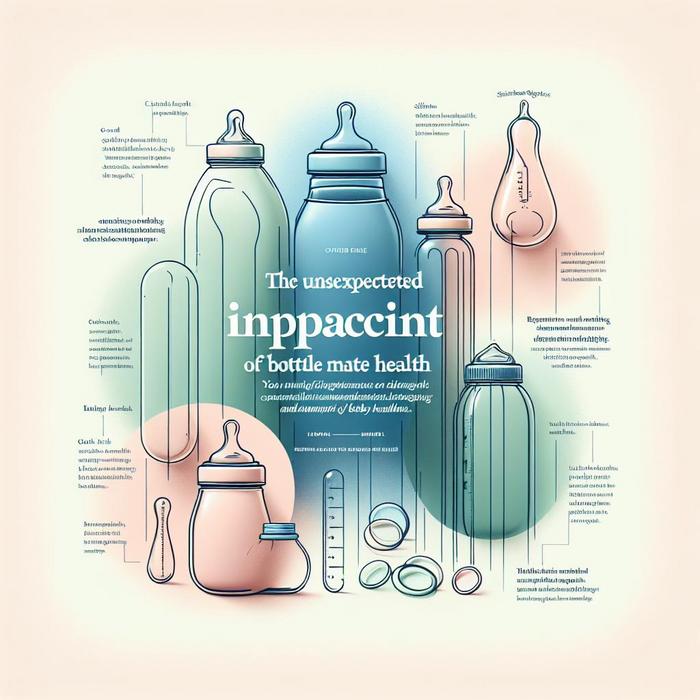The Role of Bottles in Baby’s Health
Parents tend to focus mostly on what to feed their babies, but the significance of the bottle that carries the meal is often overlooked. Bottle material impact on baby’s health is a crucial parenting insight generally dismissed. This post will explore how the materials of baby bottles can affect the health of your little ones and what you can do about it.
The Bottle Material Impact: A Groundbreaking Revelation
Scientific research has started to offer evidence that the materials used in producing baby bottles could have a profound impact on baby health. In particular, certain plastic bottles may contain harmful chemicals, such as Bisphenol A (BPA), that could potentially cause health issues when consumed over time.
These chemicals can seep into the baby’s food or drink, especially when the bottle is heated. This recent report outlines the latest findings in this research. It’s essential to stay informed about these risks as a parent and take necessary actions to ensure your baby’s safety.
How to Choose Safe Baby Bottles
Parents should consider several factors when choosing a baby bottle, beyond the design and cost. Here are some baby health tips to help guide your decision:
- Material: Opt for BPA-free plastic, glass, or stainless steel bottles. They are proven to be the safest options available in the market.
- Bottle Design: Choose a bottle design that is easy to clean. This will help you maintain hygiene and the bottle’s longevity.
- Nipple Design: Consider a nipple design that mimics breastfeeding to help your baby transition between the two more comfortably.
For a more detailed guide on selecting safe and efficient baby bottles, consider reading this informative article.
Adding Fun to Your Baby’s Feeding Routine
Beyond safety concerns, it’s essential to create a positive and enjoyable feeding experience for your baby. Adding a touch of fun to your baby’s feeding routine encourages a healthy relationship with food, making mealtime less stressful for both you and your baby. Here are some suggestions from a previous post on how to add fun to feeding times:
- Use vibrant and engaging feeding tools.
- Switch things up with different food textures and flavors.
- Create a soothing feeding environment.
In summary, bottle material is a crucial factor that has an unexpected impact on baby health. Understanding the potential risks and making informed choices can ensure your baby’s safety and wellbeing. While there is still ongoing research on the topic, these current insights provide a useful guide for parents to make the best decisions for their babies.
The Importance of Cleanliness in Baby Bottles
Maintaining cleanliness is crucial in preventing bacterial growth in the baby’s bottle. Bacteria can multiply rapidly in moist, warm environments such as a baby bottle with milk residue. These bacterial infestations can cause dangerous infections that pose threats to your baby’s health.
Given these risks, it is imperative that bottles are thoroughly cleaned and sterilized after every use. Following strict cleaning routines can ensure that your baby’s feeding bottles are safe and hygienic. Learn all about the proper cleaning methods from this comprehensive guide by Lisa Bronner.
Potential Health Impact of Bottle Materials
The long-term effects of exposure to harmful chemicals present in baby bottle plastics are a subject of ongoing research. Some scientific studies indicate a correlation between exposure to certain chemicals like BPA and health problems such as obesity, diabetes, developmental issues, and growth delays. However, it is important to note that these findings are from specific cases and do not necessarily apply universally.
A research study on the potential impacts of these chemicals on children’s health notes a ‘significant association.’ Although further investigations are required to fully understand the extent of the potential risks.
When to Replace Baby Bottles
It’s necessary to regularly observe your baby’s feeding bottles for signs of wear and tear. Any minor damage can make the bottle harder to clean thoroughly, increasing the risk of bacterial growth. It’s better to replace bottles frequently to ensure your baby’s health is not compromised.
Avoiding the Risk of Sudden Unexpected Infant Death (SUID)
Another area to consider when discussing baby bottles and their role in baby’s health is SUID. Feeding a baby lying down with a propped bottle is associated with an increased risk of SUID as per this report. Thus, baby feeding routines can significantly impact their safety.
While feeding your baby, ensure they are in a semi-upright position. This reduces the risk of food entering their windpipe, leading to choking or aspiration. The same rule applies when they fall asleep mid-feeding – gently move your baby to a safe sleeping position without a bottle.
Creating a Bond Through Bottle Feeding
Bottle feeding is not just about sustenance but also a bonding experience between you and your baby. It’s a precious time to forge a connection, build trust, and cultivate a nurturing relationship. Use this intimate opportunity to calm, soothe, and express your love for your little one.
Using a feeding bottle offers both parents a chance to be a part of the process actively. This can lead to a profound bond, impacting the baby’s emotional development positively.
Invest your time in understanding your baby’s health needs, and ensure a joyful, safe feeding routine. Remember, every small step you take can create significant outcomes in your child’s health and happiness.

